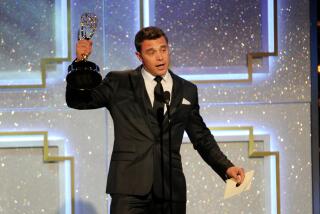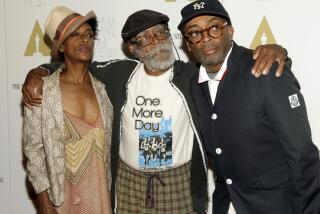Billy Taylor dies at 89; jazz pianist, composer and educator
- Share via
Billy Taylor, an acclaimed jazz pianist and composer who became one of the genre’s most ardent advocates through radio, television and the landmark Jazzmobile arts venture, has died. He was 89.
Taylor died of a heart attack Tuesday in Manhattan, said his wife, Theodora.
“He enjoyed his life,” she said. “Music was his love.”
Though he had a noteworthy career as a musician and composer that spanned decades, and played with luminaries such as Miles Davis, Dizzy Gillespie and Charlie Parker, Taylor probably was best known as a tireless jazz booster, educator and broadcaster.
He led the studio orchestra of the NBC show “The Subject Is Jazz” in 1958 and was musical director for David Frost’s talk show from 1962 to 1972. He founded Jazzmobile in the 1960s — a mobile, outdoor stage begun on a parade float that would take free music to inner-city neighborhoods. He was the host of popular jazz shows on National Public Radio starting in the late 1970s.
And, in what he later called one of his more significant accomplishments, he profiled musicians for CBS’ “Sunday Morning” show — winning an Emmy Award in 1983 for a piece on Quincy Jones.
When asked by an interviewer in 2007 how he would talk to a jazz newbie, he said it depended on the “quality of the music.”
“When it’s well-played, there’s not a lot you have to say, because if you play it right, then people get that melody, the rhythm, or whatever the aspect of the music is that is attractive to them. But one of the things that we have not done is to put jazz in the position that it deserves in our society,” he said.
For Taylor, jazz was a central musical form for telling the story of America.
“If you really listen to that, study that, everything you need to know about America is right there, and it’s up to us who’ve experienced much of that to be able to share that,” he said.
William Taylor was born July 24, 1921, in Greenville, N.C., but grew up mostly in Washington, D.C. After graduating from Virginia State College, where he studied sociology and music in the 1940s, he moved to New York City to forge a career as a jazz pianist.
He lucked out, landing a gig playing with Big Sid Catlett, Charlie Drayton and Ben Webster opposite the Art Tatum Trio, he told an interviewer in 1994.
He went on to lead the Billy Taylor Trio, and composed dozens of pieces for ensembles as well as more than 300 songs, including the popular “I Wish I Knew How It Would Feel to Be Free.”
Taylor, who earned a doctorate in music education from the University of Massachusetts at Amherst, lectured at numerous colleges and universities.
In addition to his wife, he is survived by a daughter, Kim Taylor-Thompson, a law professor at New York University. A son, Duane, died in 1988.
More to Read
Start your day right
Sign up for Essential California for the L.A. Times biggest news, features and recommendations in your inbox six days a week.
You may occasionally receive promotional content from the Los Angeles Times.







